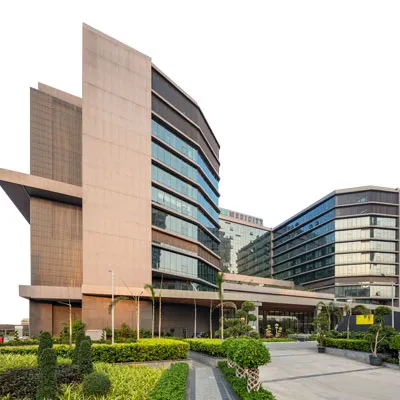Telangana’s capital Hyderabad is a major IT hub of the country. The state also contributes nearly one-third to India's production and 1/5th to its exports in the pharmaceutical sector. The state, led by Chief Minister K Chandrashekar Rao and his son KT Rama Rao, Minister for IT, Industries and MA&UD, along with the urban development department, have taken the state to new heights. It had also passed the TS-iPASS in 2014 to provide clearances to mega projects in 15 days and projects of other nature within 30 days – indeed, a breakthrough idea. The state is the only one to have introduced the Right to Clearance for industrial clearances. Further, Telangana has attracted investments worth $14 billion with the launch of its New Industrial Policy in 2015. It has also remained in the top 2 states in India for ease of doing business in the last three years consecutively.
Introducing the man at the centre of all this action: Jayesh Ranjan, Principal Secretary, Industries & Commerce (I&C) and Information Technology (IT) Departments, Government of Telangana. His assignment involves developing policy frameworks, attracting new investments, identifying opportunities of utilising it, among others.
In an exclusive video interview hosted by CONSTRUCTION WORLD, Jayesh Ranjan shares more on how the state is coping with the current pandemic and lockdown, labour reforms, technological inventions, investments received, and more...
Excerpts:
On the lockdown: While I sympathise with the requirement of having industrial and construction workers at this point in time, let us also take a balanced view. In Telangana, many migrant workers are being taken care of during the lockdown period – even if there is no work happening, their factory owners or construction contractors have secured them. They are provided with food; there is also properly health checkups for them. But there is some kind of a fear psychosis throughout the country, particularly among people who are not very highly educated. We have seen visuals and clips of people walking on the roads.
In Telangana, our district collectors tried to find out from the migrant labour what is actually compelling them to leave. The feedback we received is that they have a belief that people in large numbers are going to die. And their thought is that if they have to all die, they would want to in their own villages, among their own people. So it is more of a mindset issue. And I am confident that if we allow them to go, they will feel reassured that people back home are safe and there is no reason to panic and that their livelihoods are secure, and so they will start coming back. So what we did was before the Central Government decided to partially lift the lockdown, we informed owners of our industrial units and construction companies to convey to the labourers that we would not stop them if they want to go back, but if they are willing to stay back there is work.
Now, all industries today in Telangana are functioning. Of close to 60,000 units we have, about 35,000 odd are functional, and those that are not are because of financial issues or the market. For instance, not many factories that manufacture automotive and ancillary components are functioning as no much automotive sales is happening. So companies which have some kind of supply chain issues are not yet functioning. But almost 60 per cent units are operational as of May 7. And this data goes up on a daily basis. It will become almost 75-80 per cent soon.
Similarly, in terms of construction sites, major construction work is ongoing in Hyderabad. I am told by the Urban Development Department that there are 160 large construction worksites, of which 120 have commenced construction and industrial activities.
Labour reforms: I am aware that about five states have brought in some major reforms in labour laws. Again, to take a balanced view, while we are aiming to save the MSMEs, at the same time we should not jeopardise workers’ interests. Also, a reason that in a state like Telangana we have received huge amounts of investments – close to $14 billion dollars – is because we have healthy labour relations. We have never seen any cases of any strikes or lockouts, which are common in other parts of the country. We have balanced laws, which give protection to the labourers and take care of their interests. So despite the fact that our wages are lowest as compared to the four other southern states of Tamil Nadu, Karnataka, Andhra Pradesh and Kerala, Telangana, we provide other protections and other kinds of securities to our labour. This is what we use as a strong selling point when we talk to potential investors about Telangana, telling them that this is one state with perfect labour relations.
While we know that MSMEs and others need some flexibility, at the same time, to against the labour protection and safety will not be a good thing and will negate everything that Telangana has stood for in the last five years.
I also consulted my Labour Commissioner on the kind of labour reforms that can be considered, and he too is of the view that we should strike a balance.
Leveraging technology: With Hyderabad being a technological hub, we have developed our own apps. So right from the day the lockdown started, we were able to bring in lots of technologies in place – not just for contact tracing but also one which helps you do a self test to check if you have symptoms of COVID. It has stellar consolidation facility. Similarly, we have created a chat box for queries. We have also ensured that all the local groceries have the ability to offer their produce, accept orders online with home deliveries and digital payments. So these are multiple ways through which we have utilised technology to manage the situation.
Also, we have a large number of CCTV cameras installed on the streets and we have now installed an Artificial Intelligence software. We already had a good facial recognition software, but now with AI, the police can identify people moving without masks.
Watch the full video to know more on what Jayesh Ranjan has to say on the state’s plans going forward and more...
Stay tuned for Construction World’s FREE webinars. View our complete webinar calendar and previous webinars here.



















